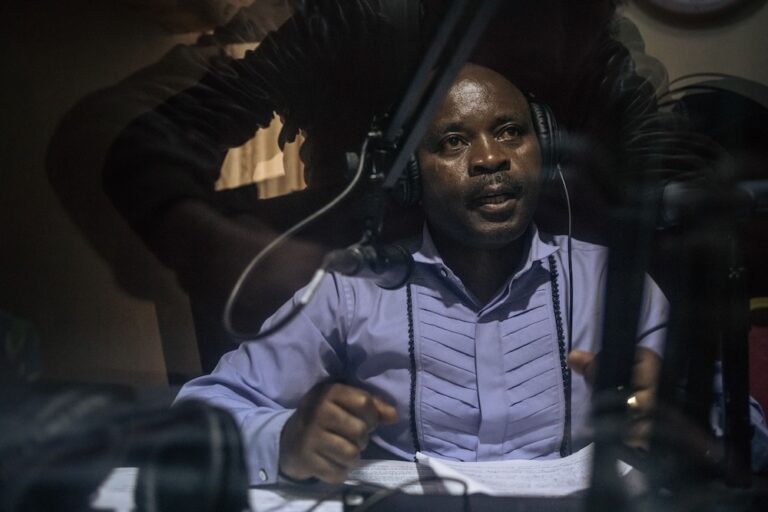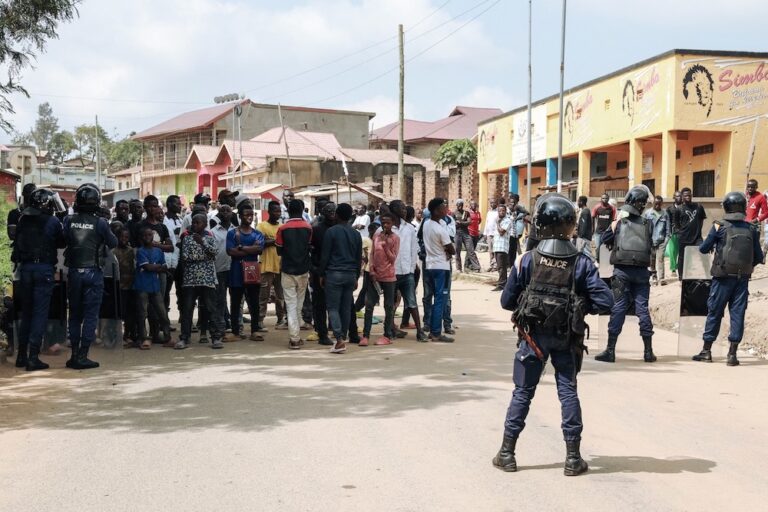Reporters Without Borders and Journalist en Danger held a joint news conference in Kinshasa on the eve of the Francophonie summit to present their report on the state of freedom of information in the Democratic Republic of Congo and Central Africa.
(JED/RSF/IFEX) – 11 October 2012 – Reporters Without Borders and its partner organization, Journalist in Danger (JED), gave a news conference in Kinshasa today, the eve of the start of a Francophonie summit in the same city, to present a report on the state of freedom of information in the Democratic Republic of Congo and Central Africa.
In this report, the two organizations remind the DRC’s president, Joseph Kabila, of the promise to combat crimes of violence against journalists that he gave at the closure of the last Francophonie summit in the Swiss city of Montreux in October 2010.
Two years later, RWB and JED find that no investigation into a media worker’s murder has ever yielded a conclusive result in the DRC, although at least eight journalists have been murdered there in recent years.
RWB and JED also report that freedom of information has deteriorated since the 2011 elections and accuse the National Intelligence Agency (ANR), local and provincial authorities, and the media regulatory body called the Higher Council for Broadcasting and Communication (CSAC) of being mostly to blame for this decline.
“As the world’s French-speaking countries gather in Kinshasa, Patrick Palata, a journalist with a privately-owned TV station, is serving a 20-year jail sentence in the same city while two other journalists, Fortunat Kasongo and Pierre Sosthène Kambidi, have been held for more than a month by the ANR,” RWB and JED say in the report.
“Similarly, the newspaper Le Journal has been suspended until further notice while the signal of one of the leading opposition TV stations, Radio Lisanga Télévision (RLTV), has been disconnected.”
Employed by Canal Congo Télévision (CCTV) in Matadi, the capital of the western province of Bas-Congo, Palata has been held for the past two years in Ndolo military prison. He received his 20-year sentence for supposedly “organizing an insurrectional movement.” There has been no response to the request for pardon that RWB and JED submitted to President Kabila.
After being arrested in the south-central province of Kasai in connection with their coverage of an army officer’s defection and the creation of an armed movement in the province, Kasongo and Kambidi were transferred to Kinshasa and have been held for nearly two months in an ANR cell without being allowed to see relatives or their lawyers.
Owned by Roger Lumbala, an influential opposition parliamentarian, RLTV suddenly found its signal had been cut without any explanation as it was broadcasting a programme entitled “Tokomi Wapi?” (Where are we now?) in which a guest, opposition parliamentarian José Makila, accused President Kabila of high treason for allegedly signing a “secret agreement” with Rwanda’s president Paul Kagame.
Days went by without either the CSAC or the ministry in charge of news media taking responsibility for cutting RLTV’s signal. After 10 days, the government spokesman and media minister finally ended his silence and defended the decision, issuing a ministerial decree that appeared to have been backdated to 8 September.
Referring to the rebel group known as M23, it accused RLTV of “broadcasting programmes in war time relaying the media campaign of the M23 negative forces and liable to demoralize the armed forces and public.” Its failure to name the offending programmes or say when they were broadcast reinforced the view that this was just a political decision to silence a TV station that was annoying the government.
RWB and JED accuse the government of acting with the same readiness to gag the media when it deported Belgian filmmaker Thierry Michel on arrival in July and banned Michel’s documentary about the murder of the leading human rights activist Floribert Chebeya.
Despite promises to the contrary by the Congolese authorities, Michel is still waiting for a visa to return to the RDC and is still waiting to show his censored film to the Congolese public.
RWB and JED are also worried by the situation elsewhere in Central Africa, where harassment and self-censorship are restricting the activities of the media. In Burundi, the radio reporter Hassan Ruvakuki had been sentenced to life imprisonment. Three journalists are in prison in Rwanda. Jean-Claude Nekim is being harassed in Chad. A dictatorship holds on to power in Equatorial Guinea.
In the reports conclusions, RWB and JED recommend that:
– The DRC government release its detained journalists, order the reopening of media that have been unjustly suspended or disconnected, amend the laws that regulate journalistic activity and decriminalize press offences.
– All the heads of state of the International Organization of the Francophonie (OIF) should reaffirm their countries’ commitment to the OIF’s values.
– French President François Hollande should continue the clear and courageous comments he made earlier this week on freedom in Central Africa, and should press his counterparts for a commitment to protect journalists and combat impunity for violence against media personnel.


